Mahindra Adventure Feature: In the Land of the Pharaohs
Egypt is a place of wonder, viewed usually through the lens of cinema or the pages of history. We got a chance to view it the best way we knew how – through the windscreen of a car.
Published On Jun 16, 2019 08:00:00 AM
12,607 Views
Follow us onThere’s a boy sticking his head out of the sunroof of a car in front of me, inhaling exhaust fumes and completely oblivious to the gnarl of traffic around him. There’s honking from aggressive drivers trying to muscle past my Mahindra Scorpio, while helmetless bikers with two or more pillions (also without helmets) weave in and out of small gaps that momentarily open up in the bumper-to-bumper crawl. A scene out of a crowded Indian city? Not quite.
We are in Alexandria, Egypt’s second-largest city on the Mediterranean coast, and the starting point of a drive across the land of Pharaohs. Our chariots for this road trip are a pair of Mahindra Scorpios and a Getaway pick-up that have just been driven from Cape Town to Cairo by a group of young artists from all over the world who did the whole drive on a shoe-string budget, which meant spending many nights in the cars to save on hotel costs!
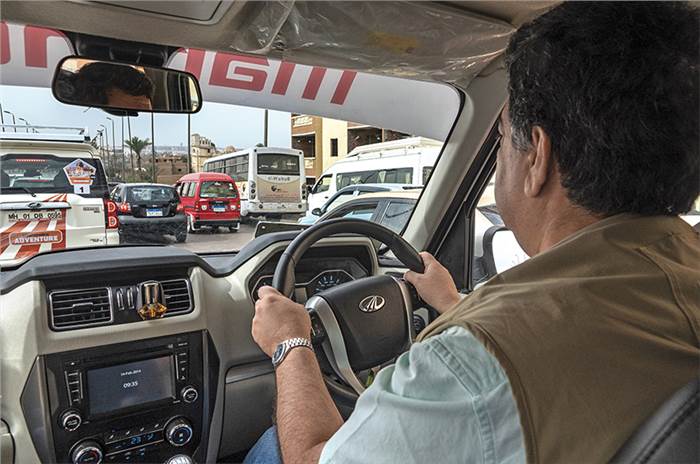
Our adventure is a lot gentler than their 240-day traipse across the entire length of the African continent, but, judging from my first day behind the wheel of the Scorpio, it’s no less exciting.
Alexandria reminds me a bit of Mumbai, with the chaotic traffic, some shabby buildings, even shabbier taxis (mostly Ladas) and the sea on one side. But, Alexandria’s ‘Marine Drive’ or Corniche is around 20km long, with the historical 15th Citadel of Qaitbey (built on the ruins of the Lighthouse of Alexandria, one of the wonders of the ancient world) at one end and the last king’s fabulous impressive Montazah Palace, at the other. The waterfront promenade in between offers some great views of the spectacularly blue Mediterranean Sea and I now know where the colour ‘mediterranean blue’ comes from.
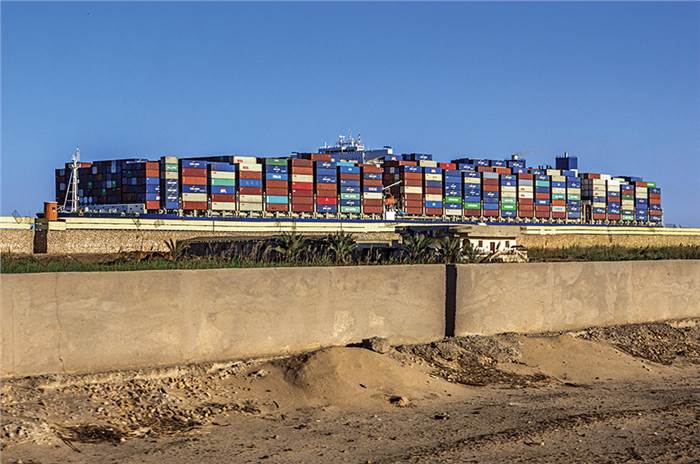
Apart from a handful of touristy sights, there’s not much to see in Alexandria, so next day we jump into our Scorpios and head east to Port Said. This is when we get our first taste of Egyptian highways, which again, feel similar to India. The roads are wide and flat but a bit uneven, exposing the Scorpio’s wallowy and bumpy ride. The good thing is that the Scorpio’s tall seating position gives me a commanding view of the road and lets me keep an eye out for aggressive drivers darting between lanes. I’ll never forget the sight of a bunch of Bajaj autorickshaws (all imported from India) battle each other, five abreast, like in Ben-Hur’s chariot race. Mad!
Driving a right-hand-drive car on the right side of the road does initially require a degree of concentration, especially while overtaking, but once used to it, highway cruising was quite effortless thanks to the SUV’s strong pulling power.
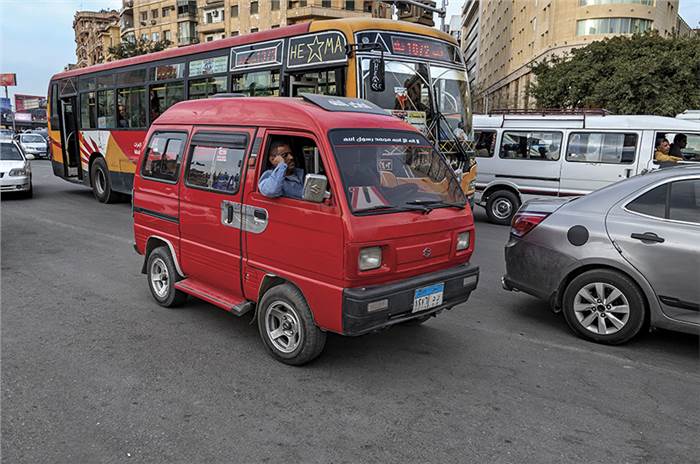
We get our first taste of the Egyptian authorities at Port Said, where the police stops us because Shreyans, our videographer, is spotted sticking his camera out of the window. It’s a bit scary the way the police swooped down on us but after a quick and thorough check of our passports, licenses and car papers, we were sent on our way – that is until the next checkpoint where the same routine is followed. Egypt is not a very camera-friendly place and we are warned not to shoot anything or anyone even remotely government-looking. We can also feel the heightened sense of security in this country, which has finally regained normalcy after the 2011 revolution.
The road from Port Said to Cairo runs alongside the Suez Canal, and the sight of massive container ships towering above the high walls that guard this sliver of water – which is Egypt’s biggest money spinner – is quite humbling. It takes an entire day to for a ship to thread through the 193km canal, but our Scorpios hit the outskirts of Cairo from Port Said in around three hours.
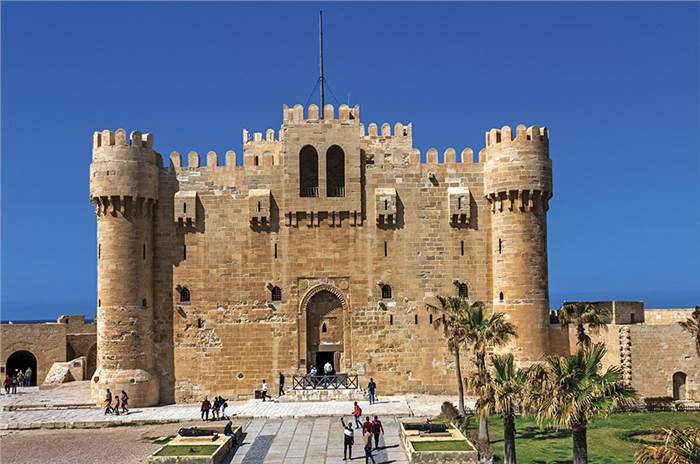
Going pyramid-shaped
The next day is a big tick off my bucket list – the Pyramids of Giza, which is just a 45min drive from the centre of the capital. At first, the pyramids don’t look that impressive but get up close to them, and you understand why they are one of the wonders of the ancient world. The inch-perfect symmetry with which over two million blocks of limestone, each weighing an average 2.3 tonnes, were arranged to form a perfectly proportioned pyramid 4,500 years ago defies belief. In fact, there are theories suggesting that aliens had a hand in building them!
The next day’s drive was to get more interesting with a sortie into the eastern edge of the Sahara near Fayoum, an oasis in the desert. However, we hadn’t bargained for just how interesting or frustrating it would turn out to be.
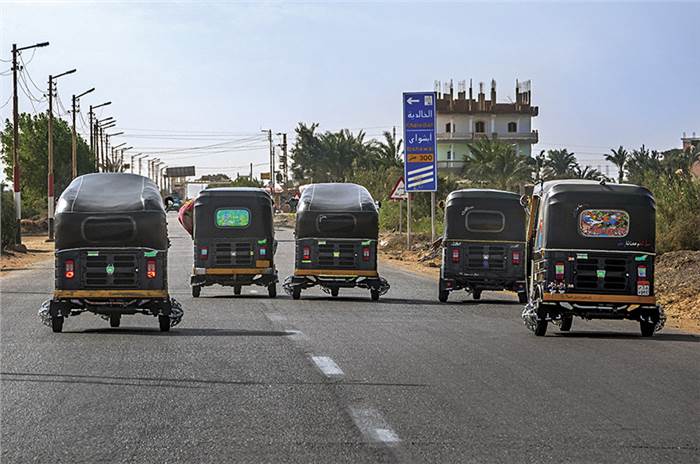
What appeared to be just another check point on the outskirts of Cairo soon looked like trouble. Our guide Ahmed was seen frantically explaining our bonafides to a rather stern-looking, plainclothes police officer who was scrutinising our papers and shaking his head in disapproval. We were directed to park inside what clearly was a police compound manned by armed cops. This didn’t look good. Two hours later, we are directed to drive to the airport customs yard, accompanied by the police, where the cars are in effect impounded, leaving us waiting on the side of the road with all our luggage. It turned out that the fine print of the law says that it’s only the people under whose name the vehicle first entered the country can drive the car – or they have to be in it, at the very least. And that was the team of young artists who drove all the way up from Cape Town. Luckily, they were still in Cairo, and it’s only when they turned up at the customs yard that the Scorpios and Getaway were released, but not without going through a mountain of paperwork.
That saga of red tape lost us a day, but the upshot is that we had Akram, Charan and Sathya for company, narrating fascinating tales from their African adventure.
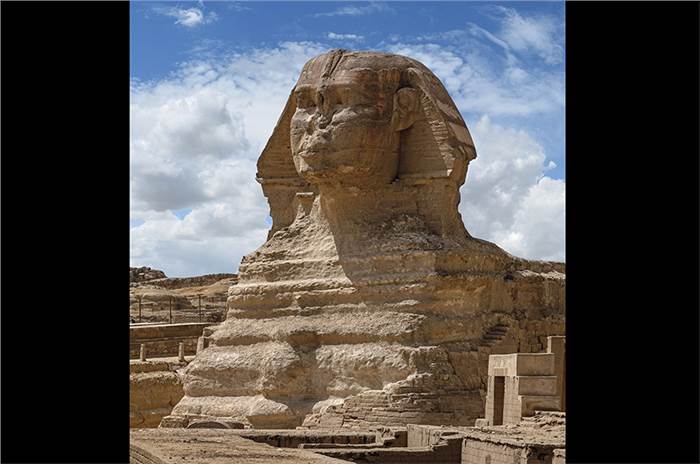
The Sahara is like no other desert in the world and you have to go there to understand its scale – which is, well, completely off the scale. It makes the Thar, which we know so well, feel like a sandbox. The nothingness all around, the sheer expanse of the desolate landscape and the spectacular rock formations rising out of an ocean of sand is simply breathtaking. Driving through this spectacular terrain using all the 4x4 capabilities of the Scorpio was great fun. Tyre pressures dropped, 4x4 low engaged, the Scorpios gamely floated across the sand, but for me, the highlight was climbing a seriously steep rocky incline – the kind that tilts you skyward – only to be rewarded with an amazing 360-degree view of the desert unfolding into the horizon.
But let’s face it, you don’t come to Egypt just for the desert. This country’s calling card is the famous pyramids, which is why we went back to them for a second time in two days; but this time with a specific mission in mind – a photo shoot with the Scorpio against the only standing wonder of the ancient world. However, it came at price. The gatekeepers of the pyramids know the value of such a photo-op and charged Mahindra a hefty US$2,000 for a 2hr shoot around the Giza complex, which also covered the iconic Sphinx. Well worth it, when you consider this was the first time ever that an Indian-made car was shot with one of the most famous wonders of the world as a backdrop, thus creating a bit of history in the process.
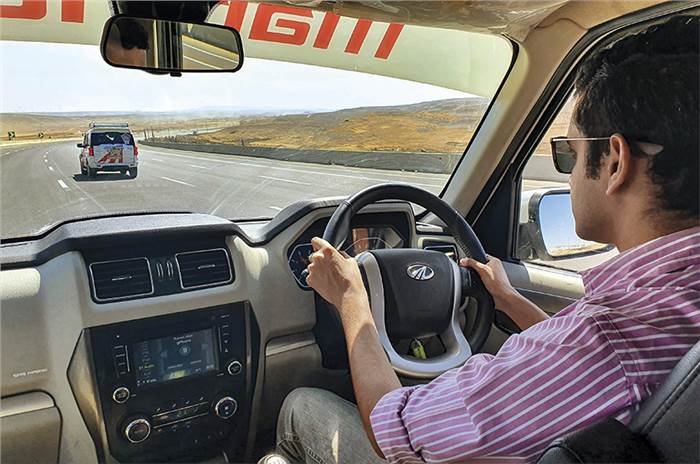
It was also here that Gavin took over from me, as work pressures sadly didn’t let me continue the rest of the drive down south to Hurghada, Luxor and Aswan. But as they say, you have to leave something for next time, or you’ll never come back.
Changing hands
I step off the plane, have my passport stamped, get into a taxi outside the airport, and about 20min later, I’m peering skyward, awestruck, at the largest man-made structure I’ve ever laid eyes on. That’s not how work trips start; that’s not how any trip starts. I’m so transfixed by the Great Pyramid, I don’t even notice the three Scorpios pulling up just a few feet away from me. My adventure starts here, and over the next five days, I’m going to see what this magnificent country has to offer.
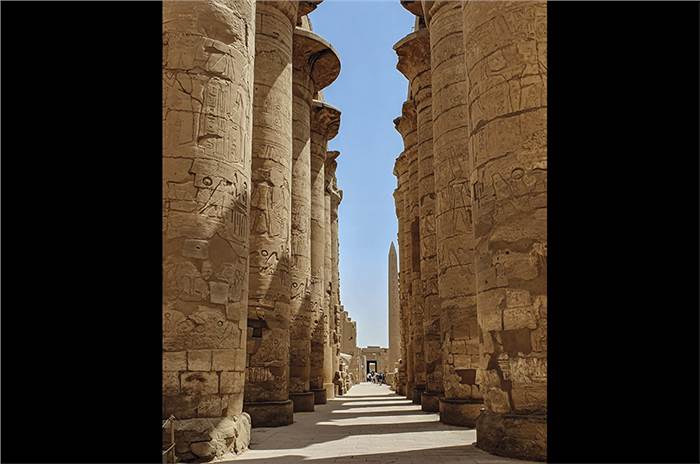
The next morning starts, much like most mornings for me back home – threading a car through a bustling rush hour. Cairo reminds me a lot of any of our cities in India. A lot of chaos, traffic darting in and out, no lane discipline. But soon, we’re able to break away from all that and get out onto the open road.
Before long, the highway gets smaller and the scenery more barren, and then our first glimpse of the next big natural attraction appears to our left, suddenly and unassumingly – the Red Sea. This massive body of blue in the midst of all this desert is a welcome change, and it’s also what has made today’s destination so very popular.
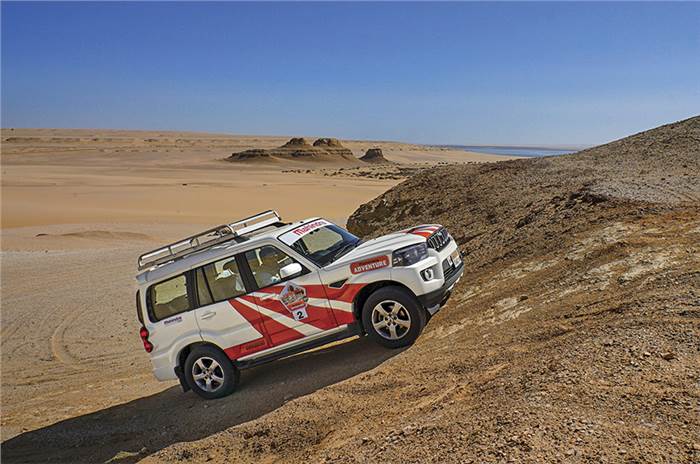
Unlike most of the stops so far, the next one isn’t a marvel of ancient history. Once a humble fishing village, Hurghada has since transformed into a very modern and luxurious resort town thanks to the abundance of beaches along the Red Sea coast. It’s alive with nightlife and a brace of luxury hotels that give you access to watersports, snorkelling and scuba diving.
Luxor is a short 300km away, and after a leisurely start the next morning, all I want to do is flick on the Scorpio’s cruise control and relax – which is just as well, because speeding is quite fiercely monitored in these parts; we see several offenders being booked at the numerous security checkpoints along the way.
Luxor is almost as chaotic as Cairo, and as I dig into a big plate of kebabs and watch the sun go down, I’m worried we won’t get a chance to even see the famous Luxor temple. On the contrary, we’re advised that it looks its best by night, under the specially designed spotlights that really bring out the detail and craftsmanship.
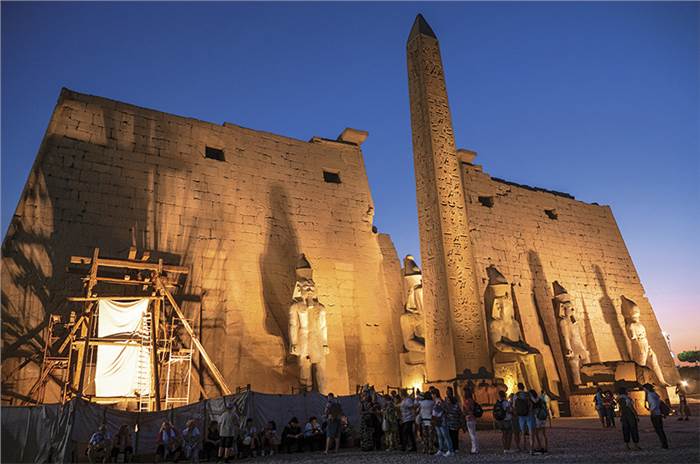
With its larger-than-life statues, pylons and obelisks, Luxor Temple is truly a sight to behold. It was renovated by many pharaohs over several dynasties, starting with Amenhotep III in about 1390 BC, Tutenkhamun and Ramses II as well. There’s even a shrine dedicated to Alexander the Great, built almost 1,000 years later.
Sky’s the limit
The next morning, we’re in for a bit of a surprise. It starts with a serene boat ride across the Nile at dawn, and soon, over the horizon, a colourful pattern emerges. At least a dozen hot-air balloons take off within minutes of each other, and soon we’d be in one ourselves.
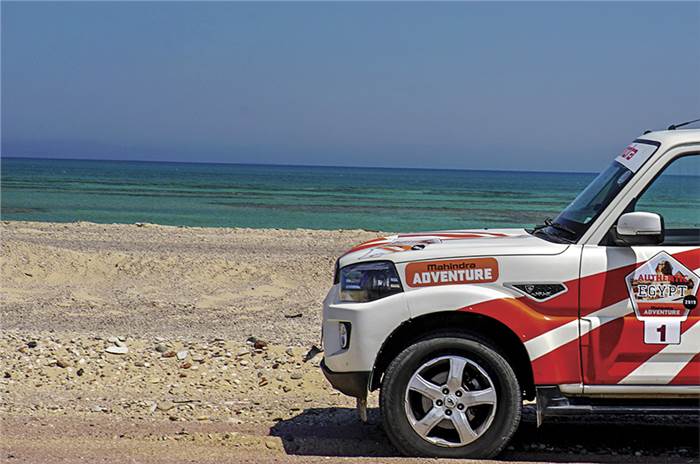
They told us filming with a drone in Egypt would be close to impossible, but this seems like a far better alternative! As we coast 2,000ft above the West Bank of the Nile, the view is truly spectacular. It’s the Valley of the Kings – tombs of various pharaohs and queens from across Egyptian history.
Later that evening, we reach Aswan – the last big city on our journey. It’s famous for its souk, or street market, an interesting way to get amongst the locals. But this is merely a pitstop to the last big attraction we would visit.
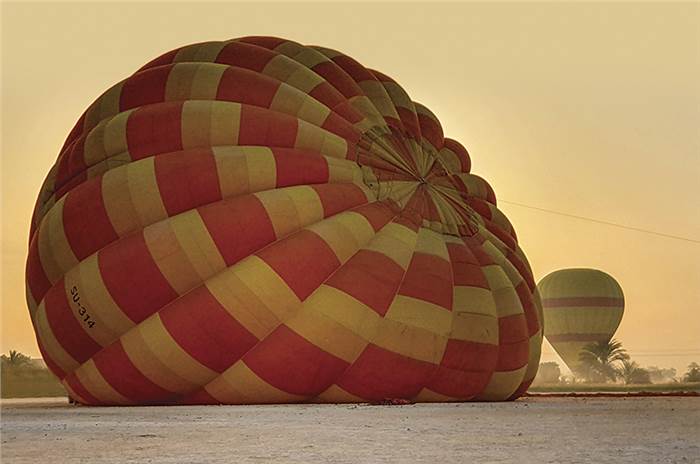
Our last day takes us to Abu Simbel, which our guide Ahmed tells us will be the best attraction of the entire trip. Frankly, I find that quite hard to believe, because gosh, have we seen a lot of really incredible stuff, so far. Carved into a mountain is the Great Temple of Ramses II – by Ramses II, for Ramses II. Possibly the most famous pharaoh of them all, he fancied himself to be a god, and inside, hieroglyphs depict stories from his life in vivid detail. The most fascinating thing about Abu Simbel, however, is that in 1968 it was moved, piece by piece, to higher ground to prevent it being flooded by the lake.
The really interesting thing about the ancient structures in Egypt is that it’s just out there for everyone to experience. You can see it, walk amongst it and feel it. But it’s not the Wonders of the World that make Egypt so endearing. It’s just the everyday things that you can only notice on a long drive like this – the people, the shops, the food, the culture.
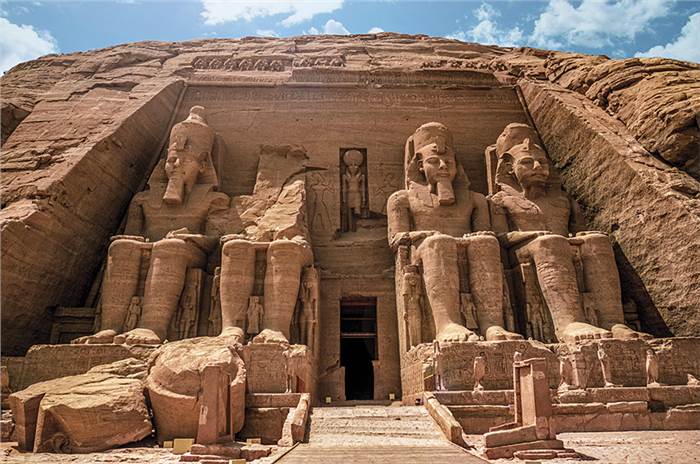
The other thing you’ll learn on a long drive like this is the car you’re in. I’ve tested the Scorpio back home, but there’s nothing like living with a car over several thousand kilometres to really tell you everything about it.
Egypt is a special place, one I highly recommend visiting at least once in your life. And if possible, do it from the driver’s seat of a car.
HORMAZD SORABJEE AND GAVIN D'SOUZA
Copyright (c) Autocar India. All rights reserved.



















.jpg&w=234&h=156&q=90&c=1)


.jpg&w=234&h=156&q=90&c=1)


Comments
Member Login
Personal Details
No comments yet. Be the first to comment.